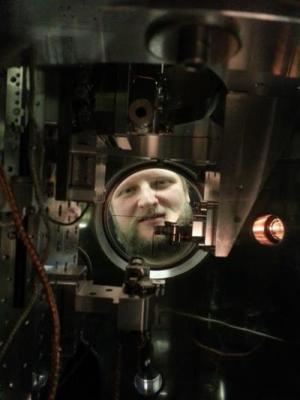Mar 15 2013
A University of Southampton academic has received a major research grant to help him explore the limitations of quantum theory.
 "This is Dr. Hendrik Ulbricht."
"This is Dr. Hendrik Ulbricht."
Dr Hendrik Ulbricht, a Reader in Physics and Astronomy, has been awarded nearly £500,000 by the John Templeton Foundation in the US.
Sir John Templeton, the late American millionaire, investor and philanthropist, created the Foundation to encourage scientists and students across the globe to explore fundamental, big questions in astronomy and cosmology that engage groundbreaking ideas on the nature of the Universe and the foundations of physics.
Dr Ulbricht and his team will be using the grant to fund experiments to investigate whether there is a limit to quantum mechanics and also to fund two new PhD students for three years.
"Quantum theory is the most fundamental and most precise description of our understanding of all the processes happening in the Universe, with the exception of gravity. Quantum theory is based on a clear mathematical apparatus and has enormous significance for the natural sciences. It also has phenomenal predictive success and plays a critical role for almost all modern technology. Therefore, to discover universal limits of this theory would have a significant impact," said Dr Ulbricht.
Previously Dr Ulbricht and his team have been exploring the theoretical possibility of conducting experiments to discover whether there is a limit to quantum theory or not. This grant will allow them to set up and conduct that experiment using matter wave interferometry of nanoparticles between 10 nanometres and 100 nanometres in diameter. They will be able to work faster, to concentrate on the physics, and to compete with strong groups around the world.
They will generate a very fragile state of matter called a quantum superposition state that describes the possibility for a single particle to be in two or more states at a time. The experiment will be based on Physicist Erwin Schrödinger's Cat paradox where the cat is in a superposition state of both half alive and half dead. The team will try to generate a Schrödinger Cat using free-flying nanoparticles at the mesoscopic scale.
"If quantum theory is unlimited we should be able to generate a quantum superposition state for very massive particles such as nanoparticles. However, if quantum theory is not valid we will be unable to generate this superposition. We simply want to test which of the two alternatives is correct and therefore if quantum theory has any limitations," said Dr Ulbricht.
"Ultimately we would like to try and extend this experiment to really macroscopic scales – to things that can be seen with the naked eye," he added.
The team will be collaborating with theoreticians in Mumbai, in India, and Trieste, in Italy.
"Our project has the potential to represent a big step forward on the road to the discovery of possible limitations of quantum theory and an even more fundamental underlying new theory, which would be a breakthrough for the foundations of physics. With this Templeton Foundation grant and hopefully more funding in the future, the University of Southampton can be one of the first places in the world to observe mesoscopic or even macroscopic superposition," said Dr Ulbricht.